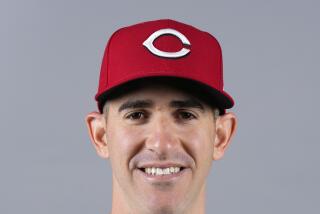Baseball a Hit in Israel--After 10 Runs, Many Errors
--After the last bahutz was called by the ump, the final score was the Jerusalem All-Stars, 7, and the Sharon Valley All-Stars, 3. Thus did that most American of sports--baseball--make its debut in Israel. The opening five-inning Little League game took an agonizing two hours to complete as the youngsters spent a lot of time retrieving wild pitches, pop flies and slipped yarmulkes. And, in a country where soccer and basketball are the most popular team sports, there are no Hebrew words for home run or strike. “Most of these kids had no idea whatsoever about bats, balls, bases,” said Lee Brooks, a coach from Minneapolis. “The one thing they really liked was the idea of whacking something with a bat.” The league was the brainchild of Randy Kahn of Houston, who decided to introduce the game to Israel after visiting his sister there in 1985 and tossing a baseball around with neighborhood children. “I started playing with the kid next door and ended up with 15 kids all dying to play,” he said. But while the initial game had a decidedly Israeli flavor--the Orthodox Jews tucked their side curls under their baseball caps--there were distinctly American touches as Jerusalem Mayor Teddy Kollek threw out the opening pitch and struck-out batters schlepped from the plate muttering under their breath. The experience was a refreshing one for Al Friedman of Los Angeles, who said he didn’t have to field a single complaint from a parent about his coaching.
--While spring turns a young man’s fancy to thoughts of love, it turns Maryland Gov. William Donald Schaefer’s to thoughts of cleaning. The chief executive has ordered all state employees to get out the elbow grease and clean their offices. In the spirit of Schaefer’s squeaky-clean philosophy, the state Department of Economic and Community Development has declared today “Good Housekeeping Day” and workers there are being issued dust cloths, furniture polish, sponges and pails. Schaeferplans to make a white-glove inspection on Friday.
--In Wakarusa, Ind., the grass around the waste water treatment plant is looking sheep-shape. Two local farmers are letting 30 sheep and four goats graze on the 30 acres around the plant’s sediment ponds, saving the town the $4,500 cost of a new sickle bar for the town tractor, Clerk-Treasurer Bob Esenwein said. “The sheep eat the grass and the goats eat the weeds,” he said. “That’s cheaper than having two guys mowing.”
More to Read
Go beyond the scoreboard
Get the latest on L.A.'s teams in the daily Sports Report newsletter.
You may occasionally receive promotional content from the Los Angeles Times.










